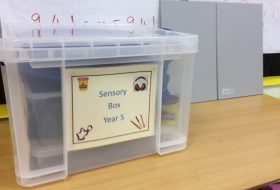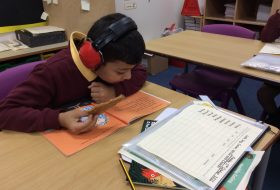PARENTS
Mental Health and Wellbeing
At St Hugh’s we take mental health and wellbeing very seriously. We are committed to supporting the emotional health and wellbeing of our pupils, staff and our community. We know that everyone experiences life challenges that can make us vulnerable and at times, anyone may need additional emotional support. We take the view that positive mental health is everybody’s business and that we all have a role to play.
At our school we:
- help children to understand their emotions and feelings better - help children feel comfortable sharing any concerns or worries - help children socially to form and maintain relationships - promote self-esteem and ensure children know that they count - encourage children to be confident and ‘dare to be different’ - help children to develop emotional resilience and to manage setbacks Sensory Needs
We work alongside OSSME (Outreach Support Service for Mainstream Education), an outreach support service for mainstream education, to provide support for children with sensory needs.
In school, we recognise the importance of children needing to regulate themselves through the use of sensory breaks. Sensory breaks provide structured support for children to regulate their emotions, energy levels, and focus in readiness for learning.
We offer children a variety of sensory breaks throughout the school day.
Classroom Sensory Zone
Every classroom is equipped with a sensory box filled with a diverse range of resources. The specific resource selected for a child is tailored to meet their individual needs.
Sensory circuits
Some children benefit from a 5-minute break to participate in a sensory circuit. After completing the circuit, they return to the classroom better prepared to focus on the rest of the lesson.



Sensory activities – lunch-time
We provide a wide range of sensory activities timetabled for all classes to access. These activities are designed to support, alerting, organising, and calming the brain.
If you would like to learn more about the sensory system please follow this link OSSME Sensory Fact Pack.


 Children & Young Person's Wellbeing Support, please click link below for more information.
Children & Young Person's Wellbeing Support, please click link below for more information. Year 5
We are now the Rocket Resilience Champions of the school. We enjoyed a one day interactive training course which
taught us about mental health and resilience.



Key Stage 2
‘The CELLs Project visited our school for the day. They delivered various workshops that taught us about making the right choice. We understood more about crime and what the consequences of bad choices could be.’



We offer different levels of support:
Universal Support
To meet the needs of all our pupils through our overall ethos and our wider curriculum. For instance, developing resilience for all.
- PSHE curriculum including circle time
- Worry Box – self referred
- THINC room
- Nurture group
- Pupil voice
- Mental health survey
- School Council
- Open door policy for Welfare and community officer
- Be a Friender
- After School Clubs (free)
- Breakfast Club (minimal charge)
- Assemblies
- Strong links with Picton Children’s Centre
- We provide opportunities for your parents/carers to come into school.
Targeted support
For those who may have short-term needs and those who may have been made vulnerable by life experiences such as bereavement.
- Language Support and nurture groups
- Seedlings
- MHST
We all have times when we have low Mental Wellbeing, where we feel stressed, upset or find it difficult to cope.
There are some common life events that may affect you or your child’s Mental Wellbeing:
– Loss or bereavement.
– Loneliness.
– Relationship problems.
– Issues at school.
– Worries about money.
Everyone deserves to feel good and there are steps you or your child can take to maintain and improve your Mental Wellbeing:
– Build positive relationships
– Take time for yourself
– Look after your mental health
– Look after your physical health
What can your child can do in school to gain Mental Wellbeing?
- Be open and talk about your feelings with your friends - Associate yourself with positive people - Join an afterschool club - Speak to a member of staff - Tell the Safeguarding and Wellbeing Team - Get physically active (a Health body and mind are closely linked)
Children’s Mental Health Week 6th 12th February
Children’s Mental Health Week 2023 will take place from 6-12 February 2023. This year’s theme is Let’s Connect.
Please click the following link for more information. Children’s Mental Health Tips for Parents and Carers
Parents' Wellbeing group
Some of our parents came along to our first Parents' Wellbeing group. They enjoyed tea and biscuits with Mrs Bushell,
Miss Bower and representatives from the GTDT (Granby Toxteth Development Trust) and the NHS.
We will be having more of these - please come along!


 Mental Health Support Team
Mental Health Support Team
The Mental Health Support Team (MHST) have developed a leaflet for schools to share with any families that they want to refer to the teams. This leaflet has been translated into the following languages: Kurdish, Farsi, Urdu, Polish and Bangladeshi (attached).
(Urdu) Parent MHST Leaflet (1)
Useful Websites:
Merseyside Youth Association’s mental health promotion https://www.mya.org.uk/RAISE
https://youngminds.org.uk/find-help/for-parents/
https://www.nhs.uk/conditions/stress-anxiety-depression/talking-to-children-about-feelings/
https://www.nhs.uk/conditions/stress-anxiety-depression/talking-to-children-about-feelings/



